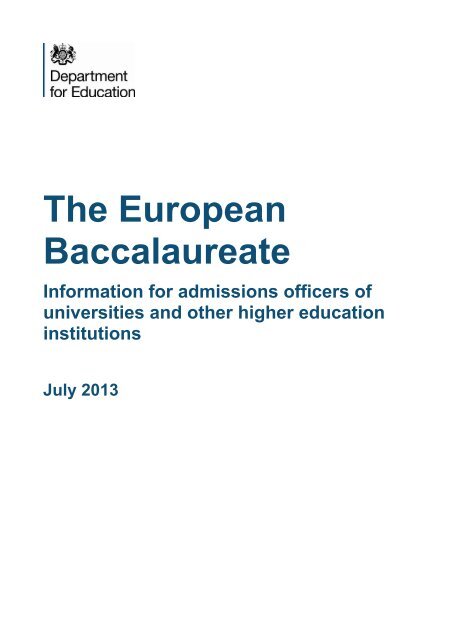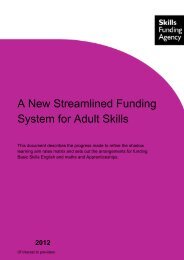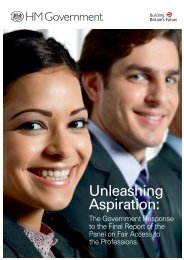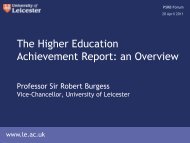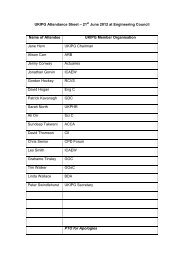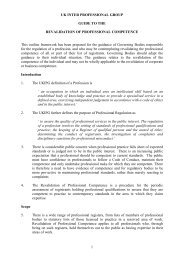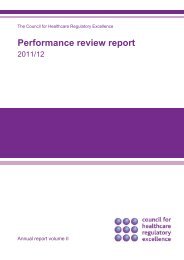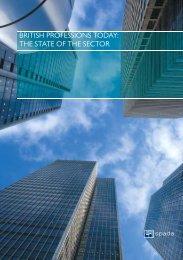Information on the European Baccalaureate - Gov.UK
Information on the European Baccalaureate - Gov.UK
Information on the European Baccalaureate - Gov.UK
Create successful ePaper yourself
Turn your PDF publications into a flip-book with our unique Google optimized e-Paper software.
The <strong>European</strong><strong>Baccalaureate</strong><str<strong>on</strong>g>Informati<strong>on</strong></str<strong>on</strong>g> for admissi<strong>on</strong>s officers ofuniversities and o<strong>the</strong>r higher educati<strong>on</strong>instituti<strong>on</strong>sJuly 2013
<strong>European</strong> Schools Missi<strong>on</strong> Statement“Educated side by side, untroubled from infancy by divisive prejudices, acquainted withall that is great and good in <strong>the</strong> different cultures, it will be borne up<strong>on</strong> <strong>the</strong>m as <strong>the</strong>ymature that <strong>the</strong>y bel<strong>on</strong>g toge<strong>the</strong>r. Without ceasing to look to <strong>the</strong>ir own lands with loveand pride, <strong>the</strong>y will become in mind <strong>European</strong>s, schooled and ready to complete andc<strong>on</strong>solidate <strong>the</strong> work of <strong>the</strong>ir fa<strong>the</strong>rs before <strong>the</strong>m, to bring into being a united and thrivingEurope.”Jean M<strong>on</strong>net 19532
C<strong>on</strong>tentsThe <strong>European</strong> <strong>Baccalaureate</strong> – An Overview 4Secti<strong>on</strong> 1: The Schools 6Secti<strong>on</strong> 2: The Students 7Secti<strong>on</strong> 3: The Curriculum 8Secti<strong>on</strong> 4: Assessment 10Secti<strong>on</strong> 5: Examinati<strong>on</strong> Results 11Secti<strong>on</strong> 6: English Language in <strong>the</strong> <strong>European</strong> <strong>Baccalaureate</strong> 12Secti<strong>on</strong> 7: Ma<strong>the</strong>matics 14Secti<strong>on</strong> 8: UCAS Applicati<strong>on</strong> Form and Offers 16Appendix 1: Fur<strong>the</strong>r <str<strong>on</strong>g>Informati<strong>on</strong></str<strong>on</strong>g> Sources and Useful Addresses 18Appendix 2: <strong>European</strong> <strong>Baccalaureate</strong> Scores and Degree Performance 19Appendix 3: <strong>European</strong> <strong>Baccalaureate</strong> to ‘A’ Level C<strong>on</strong>versi<strong>on</strong> Table 22Appendix 4: Case Studies 243
The <strong>European</strong> <strong>Baccalaureate</strong> – An OverviewAimThe aim of this document is to summarise <strong>the</strong> key elements of <strong>the</strong> <strong>European</strong><strong>Baccalaureate</strong> (EB), mainly to assist admissi<strong>on</strong>s officers at universities and o<strong>the</strong>rinstituti<strong>on</strong>s of higher educati<strong>on</strong> in <strong>the</strong> United Kingdom. It will however also be of interestto parents and potential employers, and is issued by <strong>the</strong> Department for Educati<strong>on</strong>,replacing <strong>the</strong> guidance produced in 2009.Introducti<strong>on</strong>The EB is <strong>the</strong> school-leaving examinati<strong>on</strong> for students who attend <strong>on</strong>e of <strong>the</strong> <strong>European</strong>Schools. There are currently around 24,000 students in <strong>the</strong> system as a whole andapproximately 1,500 take <strong>the</strong> final examinati<strong>on</strong> each year. These numbers are growingannually as <strong>the</strong> system expands. The <strong>European</strong> Schools were established to educate <strong>the</strong>children of parents working in <strong>European</strong> Uni<strong>on</strong> (EU) instituti<strong>on</strong>s. A broad curriculum isfollowed throughout <strong>the</strong> sec<strong>on</strong>dary phase, with a particular feature being <strong>the</strong> fact thatstudents take subjects such as history and geography in <strong>the</strong>ir sec<strong>on</strong>d language fromYear 3 (Year 9 in <strong>the</strong> English system). Although <strong>the</strong> schools are open to <strong>the</strong> whole abilityrange, children must pass each year and meet clear academic criteria. If not, <strong>the</strong>y mustrepeat <strong>the</strong> year and ultimately leave <strong>the</strong> school if <strong>the</strong>y fail <strong>the</strong> same year twice.The <strong>European</strong> Schools have high academic standards, with motivated students andsupportive parents. A student taking <strong>the</strong> minimum number of periods/less<strong>on</strong>s wouldreceive over 1,500 hours of guided learning during <strong>the</strong> two-year programme.Validati<strong>on</strong>The EB is officially recognised by treaty as an entry qualificati<strong>on</strong> for higher educati<strong>on</strong> inall EU countries, as well as many o<strong>the</strong>rs. As a result, <strong>European</strong> School students attenduniversities all over Europe and bey<strong>on</strong>d. The examining board, which oversees <strong>the</strong>examinati<strong>on</strong>s in all language secti<strong>on</strong>s, is chaired by a university professor, and iscomposed of examiners from all EU countries. They are appointed annually by <strong>the</strong><strong>European</strong> Schools Board of <strong>Gov</strong>ernors and must meet <strong>the</strong> requirements laid down in<strong>the</strong>ir home countries for appointment to examining boards of <strong>the</strong> same level. The closescrutiny of <strong>the</strong> examining board, which demands double assessment of <strong>the</strong> final writtenand oral examinati<strong>on</strong>s, guarantees <strong>the</strong> high level and quality of <strong>the</strong> EB.4
The Examinati<strong>on</strong>The EB is a demanding examinati<strong>on</strong> where students must study 10 or 11 subjects.Students are required to study <strong>the</strong>ir own language, at least <strong>on</strong>e foreign language to ahigh level, history and geography in that foreign language, ma<strong>the</strong>matics, at least <strong>on</strong>escience subject, philosophy, physical educati<strong>on</strong> and religi<strong>on</strong>/ethics. They must addelective courses to this, for example more sciences and languages, or <strong>the</strong> same subjectsat a higher level. This means that, despite <strong>the</strong> large compulsory element in <strong>the</strong> EB,students are able to build up a programme which reflects <strong>the</strong>ir particular interests andstrengths. The EB diploma is based <strong>on</strong> performance in <strong>the</strong> final year.The MarksTo obtain <strong>the</strong> EB a student must obtain a minimum of 60% overall and in <strong>the</strong>ory scorescan range up to 100%. A mark out of 10 is also awarded for each individual subject.Students <strong>the</strong>refore have to be able to perform well across a wide range of academicsubjects to obtain a good overall score in <strong>the</strong> EB.5
Secti<strong>on</strong> 2: The StudentsStudents are educated from age 4-19 in <strong>the</strong> <strong>European</strong> Schools at Nursery (2 years),Primary (5 years) and Sec<strong>on</strong>dary level (7 years). Each school has a number of languagesecti<strong>on</strong>s. All students are enrolled in a language secti<strong>on</strong> which is usually that of <strong>the</strong>irmo<strong>the</strong>r t<strong>on</strong>gue or of <strong>the</strong>ir first foreign language (L2) if <strong>the</strong>y have a mo<strong>the</strong>r t<strong>on</strong>gue forwhich <strong>the</strong>re is no language secti<strong>on</strong> in <strong>the</strong> particular school.They start less<strong>on</strong>s in a sec<strong>on</strong>d language from Primary 1 and must c<strong>on</strong>tinue with <strong>the</strong>irsec<strong>on</strong>d language until <strong>the</strong>y complete <strong>the</strong> EB. In years 4 to 7 of <strong>the</strong> Sec<strong>on</strong>dary cycle,students must also study history and geography and social sciences, if chosen, in <strong>the</strong>irsec<strong>on</strong>d language.Students in <strong>the</strong> <strong>European</strong> Schools are obliged to use <strong>the</strong> foreign language(s) <strong>the</strong>y learnin <strong>the</strong>ir everyday life and in communicati<strong>on</strong> with fellow students and o<strong>the</strong>r members of<strong>the</strong> school community. This c<strong>on</strong>tributes in a significant way to an excellent workingknowledge of languages.As a result, <strong>the</strong> <strong>European</strong> Schools foster a unique multicultural outlook in students whichis a great advantage in both higher educati<strong>on</strong> and in subsequent employment.Ano<strong>the</strong>r feature of <strong>the</strong> schools is that students are required to attain a certain level ofacademic achievement each year before <strong>the</strong>y can be promoted to <strong>the</strong> next year.7
Secti<strong>on</strong> 3: The CurriculumIn <strong>the</strong> sec<strong>on</strong>dary school, students are taught in 45 minute periods with a minimum of 31and usually a maximum of 35 periods per school week.The sec<strong>on</strong>dary school curriculum is divided into three stages.Year 1 to 3Students follow a broad academic curriculum including languages 1 and 2, language 3from year 2 <strong>on</strong>wards, ma<strong>the</strong>matics, integrated science, religi<strong>on</strong>/ethics and sport. Humanscience is taught in language 1 in years 1 and 2 and in language 2 from year 3 <strong>on</strong>wards.Year 4 and 5Students c<strong>on</strong>tinue to follow a broad curriculum during <strong>the</strong>se two years which includes alarge number of compulsory subjects.They must take ma<strong>the</strong>matics for 4 or 6 periods per week and languages 1, 2 and 3 (alltaught in <strong>the</strong> language c<strong>on</strong>cerned). Biology, chemistry and physics are studied for 2periods per week each. History and geography are studied for 2 periods each in <strong>the</strong>student’s sec<strong>on</strong>d language. At least two elective subjects must be chosen from, forexample, language 4, ec<strong>on</strong>omics, Latin, Greek, art, music and IT.There is no GCSE examinati<strong>on</strong> equivalent at <strong>the</strong> end of year 5 but students are awardedan overall year grade in each subject based <strong>on</strong> coursework assessment and two sets ofexaminati<strong>on</strong>s, <strong>the</strong> sec<strong>on</strong>d of which is harm<strong>on</strong>ised across language secti<strong>on</strong>s.Year 6 and 7These two years lead to <strong>the</strong> EB. Students must study at least ten subjects and areexamined by means of written and oral examinati<strong>on</strong>s and by c<strong>on</strong>tinuous assessment.There is a core of compulsory subjects which include language 1 (mo<strong>the</strong>r t<strong>on</strong>gue),language 2 (first foreign language), ma<strong>the</strong>matics, history, geography, philosophy,religi<strong>on</strong>/ethics and sport. In additi<strong>on</strong>, if no science subject is taken as an elective subject,students must also take a course of two less<strong>on</strong>s per week in biology.Students must take a minimum of two elective subjects of four less<strong>on</strong>s per week and maytake as many as four. These subjects may include each of <strong>the</strong> separate sciences, socialsciences, Latin, art, music, philosophy and languages 3 and 4. Ma<strong>the</strong>matics can be takenas a 3-less<strong>on</strong> or 5-less<strong>on</strong> per week course. Additi<strong>on</strong>al advanced courses of three less<strong>on</strong>sper week may be taken in ma<strong>the</strong>matics, language 1 and language 2. Students may alsochoose complementary courses of two less<strong>on</strong>s per week such as practical science,8
introductory ec<strong>on</strong>omics, art, music and <strong>the</strong>atre. The table below is an example of <strong>the</strong>choices available for students.Sample Course Structure: Years 6 and 7Subject Choice – General RulesTotal Study Programme: minimum 31 periods.Columns 1 to 4: minimum 29 periodsColumn 3: minimum 2 opti<strong>on</strong>s, maximum 4 opti<strong>on</strong>sCOMPULSORY SUBJECTSOPTIONAL COURSES(Elective subjects)COMPLEMENTARYCOURSESColumn 1 Column 2 Column 3 Column 4 Column 5Language 14pHistory2pArt4pAdvanced L13pArt2pLanguage 23pGeography2pMusic4pAdvanced L23pEc<strong>on</strong>omics2pMaths 3orMaths 53p5pPhilosophyBiology2p2pBiologyChemistry4p4pAdvanced Maths3pITLab Biology2p2pReligi<strong>on</strong>/Ethics1pPhysics4pLab Chemistry2pSport2pGeography4pLab Physics2pHistory4pMusic2pPhilosophy4pSociology2pEc<strong>on</strong>omics4pPolitics2pLatin4pTheatre studies2pAncient Greek4pLanguage 52pLanguage 34pLanguage 44p9
Secti<strong>on</strong> 4: AssessmentThe grading system for individual subjects uses a 0 to 10 scale with 6.0 as a pass mark.When a candidate is awarded <strong>the</strong> EB, <strong>the</strong> overall mark is expressed as a percentage and60% is a pass.There are three main comp<strong>on</strong>ents that c<strong>on</strong>tribute to <strong>the</strong> overall mark.The relative c<strong>on</strong>tributi<strong>on</strong>s of <strong>the</strong> comp<strong>on</strong>ents to <strong>the</strong> EB are:Preliminary mark 50%Written Examinati<strong>on</strong>s 35%Oral Examinati<strong>on</strong>s 15%Preliminary MarkInternal examinati<strong>on</strong>s c<strong>on</strong>stitute 60% of <strong>the</strong> preliminary mark. The remaining 40% isc<strong>on</strong>tinuous assessment throughout <strong>the</strong> year.Written Examinati<strong>on</strong>sCandidates take five written examinati<strong>on</strong>s which must include language 1, language 2,ma<strong>the</strong>matics and two of <strong>the</strong> 4-period elective subjects. These examinati<strong>on</strong>s are set by apanel of subject specialists. Marking is carried out by subject teachers and by externalexaminers. The two marks are averaged, with overall supervisi<strong>on</strong> by <strong>the</strong> subjectinspector.Oral Examinati<strong>on</strong>s (certain restricti<strong>on</strong>s apply)Candidates take three subjects as oral examinati<strong>on</strong>s• language 1 (advanced, if studied)• language 2 (advanced, if studied)OR history or geography (if not already taken as a written exam)• a four-period elective subject if not taken as a written examOR a two-period subject from Column 2 of <strong>the</strong> tableOR advanced ma<strong>the</strong>matics (compulsory if this has been studied)10
Secti<strong>on</strong> 5: Examinati<strong>on</strong> ResultsThe average overall pass rate in <strong>the</strong> EB has been nearly 98% over <strong>the</strong> last five years(2008-2012). This excepti<strong>on</strong>ally high figure reflects <strong>the</strong> fact that any student sitting <strong>the</strong>final examinati<strong>on</strong> has already been through a rigorous annual m<strong>on</strong>itoring procedure afterjoining <strong>the</strong> system.The average overall mark in <strong>the</strong> EB across <strong>the</strong> schools has risen <strong>on</strong>ly very slightly overtime, and <strong>the</strong> average over <strong>the</strong> last ten years is very close to 76% with a modest increasein <strong>the</strong> percentage of students obtaining marks of 80%+.It is extremely difficult to score 90% or more. This reflects <strong>the</strong> demanding nature of<strong>the</strong> examinati<strong>on</strong> process and <strong>the</strong> fact that students need to perform very wellacross a very broad range of subjects.The table below summarises <strong>the</strong> average overall mark distributi<strong>on</strong> for <strong>the</strong> last five years(to 2012, representing 7,332 students):MarkRange0 -59.9960 -64.9965-69.9970-74.9975-79.9980-84.9985-89.9990-94.9995 ormore% ofstudents2.0 8.0 15.3 17.6 19.4 18.5 12.6 5.8 0.7While it is difficult to make direct comparis<strong>on</strong>s between <strong>the</strong> students taking <strong>the</strong> EB andthose taking more familiar examinati<strong>on</strong>s, attenti<strong>on</strong> is drawn to <strong>the</strong> results of <strong>the</strong> PISAbasedtest for schools in which <strong>the</strong> <strong>European</strong> School Culham in Oxfordshire participatedin 2012. This pilot trial allows comparis<strong>on</strong>s to be made between <strong>the</strong> applied knowledgeand competencies in reading, ma<strong>the</strong>matics and science of <strong>European</strong> School students(aged 15) and <strong>the</strong> results from <strong>the</strong> internati<strong>on</strong>al PISA 2009 assessment. In all three areas<strong>the</strong> students achieved scores which would have put <strong>the</strong> <strong>European</strong> School Culham in <strong>the</strong>top 10% of <strong>UK</strong> schools (state and private) participating in PISA 2009.PISA report <strong>on</strong> <strong>the</strong> <strong>European</strong> School Culhamhttp://www.esculham.co.uk/wp-c<strong>on</strong>tent/uploads/2013/03/PISA-Based-TestforSchools_The-<strong>European</strong>-School-Culham-report-ebook-1.pdfSee Appendices 1 and 2 for o<strong>the</strong>r sources of informati<strong>on</strong> and statistics.11
Secti<strong>on</strong> 6: English Language in <strong>the</strong> <strong>European</strong><strong>Baccalaureate</strong>English Language 1This compulsory mo<strong>the</strong>r t<strong>on</strong>gue course is taken by almost all students in <strong>the</strong> Englishsecti<strong>on</strong>. From <strong>the</strong> sixth year of Sec<strong>on</strong>dary school it may be taken at advanced level inadditi<strong>on</strong> to <strong>the</strong> main course.Assessment: Written and oral examinati<strong>on</strong>s are literature based. Students who havefollowed <strong>the</strong> advanced course take <strong>the</strong>ir final examinati<strong>on</strong>s at this level. Use of languageis assessed in <strong>the</strong> c<strong>on</strong>text of literature essays.Teaching is to A Level standard or Internati<strong>on</strong>al <strong>Baccalaureate</strong> Higher level.A grade 6.0 (pass) in <strong>the</strong> EB would be sufficient to follow a n<strong>on</strong>-literary <strong>UK</strong> universitycourse.Note: N<strong>on</strong> mo<strong>the</strong>r-t<strong>on</strong>gue students may choose English L2, L3 or L4.English Language 2This compulsory course is taken by students whose mo<strong>the</strong>r t<strong>on</strong>gue is not English,although <strong>the</strong>y may in some cases have followed almost all <strong>the</strong>ir subjects in English (thatis, those without a language secti<strong>on</strong> for <strong>the</strong>ir own mo<strong>the</strong>r t<strong>on</strong>gue who have <strong>the</strong>reforebeen in <strong>the</strong> English secti<strong>on</strong> of <strong>the</strong> school). If students have spent <strong>the</strong>ir entire schooling in<strong>the</strong> <strong>European</strong> Schools <strong>the</strong>y will have been studying English since primary level. From <strong>the</strong>sixth year of sec<strong>on</strong>dary school language 2 may be taken at advanced level in additi<strong>on</strong> to<strong>the</strong> main course.Assessment: Those who have followed <strong>the</strong> advanced course take <strong>the</strong>ir final examinati<strong>on</strong>sat this level. All students take a written examinati<strong>on</strong>.The main course paper c<strong>on</strong>sists of 20% reading comprehensi<strong>on</strong>, 40% writing in a givenregister (marked equally for language and c<strong>on</strong>tent), and 40% writing about literature in<strong>the</strong> c<strong>on</strong>text of a set <strong>the</strong>me (marked equally for language and c<strong>on</strong>tent).The advanced course paper c<strong>on</strong>sists of 50% detailed writing about a set text and 50%writing about a set <strong>the</strong>me. Everything is marked equally for language and c<strong>on</strong>tent.All students take an oral examinati<strong>on</strong> through <strong>the</strong> medium of English. They can choosebetween an oral examinati<strong>on</strong> in <strong>the</strong> L2 course and an oral examinati<strong>on</strong> in ei<strong>the</strong>r history orgeography (which are taught in <strong>the</strong> sec<strong>on</strong>d language).12
The pass level (grade 6.0) of <strong>the</strong> L2 exam equates approximately to level C1 in <strong>the</strong>Comm<strong>on</strong> <strong>European</strong> Framework of Reference for Languages, with many studentsoperating at C2 or mo<strong>the</strong>r t<strong>on</strong>gue level in both languages because <strong>the</strong>y are bilingual andbiliterate.A grade 7.0 in <strong>the</strong> EB is sufficient to follow a n<strong>on</strong>-literary <strong>UK</strong> university course.A candidate with this level or higher should NOT be required to take a supplementaryEnglish test.English Language 3This compulsory course is taken from <strong>the</strong> sec<strong>on</strong>d year of sec<strong>on</strong>dary school, and is anopti<strong>on</strong> from <strong>the</strong> sixth year <strong>on</strong>wards. The final examinati<strong>on</strong> is <strong>the</strong>refore taken by studentswho have been studying English for six years. Students can opt to take ei<strong>the</strong>r <strong>the</strong> writtenor <strong>the</strong> oral exam.Assessment: The written paper c<strong>on</strong>sists of 30% reading comprehensi<strong>on</strong>, 30% writing in agiven register (marked equally for language and c<strong>on</strong>tent), and 40% writing about setliterature texts (marked equally for language and c<strong>on</strong>tent).The oral examinati<strong>on</strong> is 100% language and communicati<strong>on</strong>-based.The pass level (grade 6.0) of <strong>the</strong> L3 exam broadly equates to between level B1 and B2 of<strong>the</strong> Comm<strong>on</strong> <strong>European</strong> Framework of Reference for Languages, but most candidates areabove B2 level.7.0-7.5 in L3 is sufficient to follow a n<strong>on</strong>-literary <strong>UK</strong> university course.English Language 4This course is opti<strong>on</strong>al from <strong>the</strong> fourth year of sec<strong>on</strong>dary school <strong>on</strong>wards. The finalexaminati<strong>on</strong> is <strong>the</strong>refore taken by students who have been studying English for fouryears. Students can opt to take ei<strong>the</strong>r <strong>the</strong> written or oral exam.Assessment: The written paper c<strong>on</strong>sists of 60% comprehensi<strong>on</strong> and language, and 40%writing.The oral examinati<strong>on</strong> is 100% language and communicati<strong>on</strong>-based.The pass level broadly equates to level B1 of <strong>the</strong> Comm<strong>on</strong> <strong>European</strong> Framework.Note: in a study made by <strong>the</strong> <strong>European</strong> Parliament of <strong>European</strong> Schools alumni, <strong>the</strong> vastmajority of resp<strong>on</strong>dents to <strong>the</strong> survey said that <strong>the</strong>ir level of English was high enough for<strong>the</strong>ir academic career. See Appendix 1 for <strong>the</strong> link to this report.13
Secti<strong>on</strong> 7: Ma<strong>the</strong>maticsThere are three possible ma<strong>the</strong>matics courses available to students for <strong>the</strong> two years of<strong>the</strong> <strong>European</strong> <strong>Baccalaureate</strong>.1 Standard level course (three periods per week)2 Higher level course (five periods per week)3 Advanced level course (three periods per week)All students must take ei<strong>the</strong>r <strong>the</strong> standard level course or <strong>the</strong> higher level course.Students who are taking <strong>the</strong> higher level course may, in additi<strong>on</strong>, take <strong>the</strong> advanced levelcourse.Standard level courseThis course is for students of all abilities and is for those who do not intend to studyuniversity courses requiring an extensive knowledge of ma<strong>the</strong>matics.Syllabus:50% - Analysis – functi<strong>on</strong>s, (including exp<strong>on</strong>ential and logarithmic),sequences, basic calculus25% - Probability and distributi<strong>on</strong>s25% - Statistics – <strong>on</strong>e-variable and bivariateAssessment: All students take a 3-hour written examinati<strong>on</strong> (60 minutes withoutcalculator and 120 minutes with a calculator with CAS software)This course c<strong>on</strong>tains elements equivalent to A2 and AS Level.Higher level courseThis course is for students who will benefit from having a solid ma<strong>the</strong>matical foundati<strong>on</strong>and is appropriate for those who intend studying ma<strong>the</strong>matics or subjects requiring anextensive knowledge of ma<strong>the</strong>matics, such as engineering, physics or some ec<strong>on</strong>omicscourses.Syllabus:36% - Analysis – functi<strong>on</strong>s, calculus, sequences27% - Analytical Geometry in three dimensi<strong>on</strong>s27% - Probability, distributi<strong>on</strong>s and modelling10% - Complex numbersAssessment: All students take a 4-hour written examinati<strong>on</strong> (60 minutes withoutcalculator and 180 minutes with a calculator with CAS software)14
The c<strong>on</strong>tent and level of difficulty of this course is equivalent to elements of GCE A Leveland bey<strong>on</strong>d. A student who achieves a good pass in this course has sufficient knowledgeand ability to follow university courses requiring significant ma<strong>the</strong>matical c<strong>on</strong>tent.Advanced level courseThis opti<strong>on</strong>al course can <strong>on</strong>ly be taken by students who have chosen Higher levelma<strong>the</strong>matics. It is appropriate for those who intend to study ma<strong>the</strong>matics at universityand would also be useful, but not essential, for those intending to study subjects requiringan extensive knowledge of ma<strong>the</strong>matics.Syllabus:6 th year compulsory parts:- Foundati<strong>on</strong>s of ma<strong>the</strong>matics (sets, logic, mappings and groups)- Determinants and linear algebra- Numerical analysis6 th year opti<strong>on</strong>al parts (1 <strong>on</strong>ly):- Vector spaces- Direct isometries and similarities in <strong>the</strong> complex plane7 th year compulsory parts:- Trig<strong>on</strong>ometric functi<strong>on</strong>s- Limits and power series7 th year opti<strong>on</strong>al parts:2 topics from a list of 28 chosen by <strong>the</strong> students and <strong>the</strong> teacherAssessment: All students take an oral examinati<strong>on</strong>.For <strong>the</strong> purposes of comparis<strong>on</strong>, a candidate studying <strong>the</strong> compulsory Maths 5 and 3period courses would have at least 240 and 144 hours of guided learning respectivelyduring <strong>the</strong> two year EB programme.See Appendix 1 for links to syllabuses and o<strong>the</strong>r informati<strong>on</strong>.15
Secti<strong>on</strong> 8: UCAS Applicati<strong>on</strong> Form and OffersThe UCAS Applicati<strong>on</strong> FormInstituti<strong>on</strong>s need to be aware that:1. In <strong>the</strong> Qualificati<strong>on</strong>s Secti<strong>on</strong> of <strong>the</strong> UCAS form EB students do not have GCSEresults to record. Instead <strong>the</strong>y provide <strong>the</strong>ir overall mark for Year 6 (Year 12 in <strong>the</strong><strong>UK</strong> system) in each subject. This reflects both internal examinati<strong>on</strong>s andc<strong>on</strong>tinuous assessment and is expressed as a mark out of 10.2. Students may occasi<strong>on</strong>ally give <strong>the</strong>ir overall mark for Year 5 in selected subjectsif <strong>the</strong>y are felt to be particularly relevant to <strong>the</strong> proposed course of study, but havenot been taken in Year 6.3. All subjects (with <strong>the</strong> excepti<strong>on</strong> of religi<strong>on</strong>/ethics) count towards <strong>the</strong> final EB score,though <strong>on</strong>ly certain subjects are taken in <strong>the</strong> final written and oral examinati<strong>on</strong>s(see Secti<strong>on</strong> 4 of this document for fur<strong>the</strong>r details).Around half of <strong>European</strong> School applicants to <strong>UK</strong> universities are likely to be n<strong>on</strong>-Britishor Irish nati<strong>on</strong>als and many will <strong>the</strong>refore not have studied English as <strong>the</strong>ir mo<strong>the</strong>rt<strong>on</strong>gue.Typical Offers to CandidatesIn <strong>the</strong> past, universities have made <strong>the</strong> following types of offers:• Specifying an overall EB score (as a percentage).• Specifying an overall EB score (%) combined with marks out of 10 in specificsubjects.Instituti<strong>on</strong>s should c<strong>on</strong>sider <strong>the</strong> following points:1. Offers asking <strong>on</strong>ly for a final EB score are most suitable for subjects requiring abroad educati<strong>on</strong>, with evidence of attainment across a wide curriculum.2. For degree courses not requiring any specific subject knowledge <strong>on</strong> entry, <strong>the</strong>breadth of <strong>the</strong> EB should be seen as an advantage.3. For courses prescribing certain A level subjects, instituti<strong>on</strong>s may wish to specify<strong>the</strong> marks to be attained in particular subjects.4. It would be very unusual to specify marks in more than three subjects, even for <strong>the</strong>most competitive courses.16
5. It is not generally necessary for instituti<strong>on</strong>s to require fur<strong>the</strong>r evidence of <strong>the</strong>applicant’s fluency in English. See Secti<strong>on</strong> 6 (English Language).17
Appendix 1Fur<strong>the</strong>r <str<strong>on</strong>g>Informati<strong>on</strong></str<strong>on</strong>g> Sources and Useful Addresses1. The <strong>European</strong> Schools website, which includes links to each individual schoolhttp://www.eursc.eu/index.php?id=22. Syllabuseshttp://www.eursc.eu/index.php?id=1433. UCAS informati<strong>on</strong> <strong>on</strong> <strong>the</strong> <strong>European</strong> <strong>Baccalaureate</strong>http://www.ucas.com/he_staff/quals/europeanbacc4. Parliament report: a full report produced by van Dijk Management C<strong>on</strong>sultants(Brussels) from <strong>the</strong> University of Liège (2008)http://www.europarl.europa.eu/activities/committees/studies/download.do?file=229315. PISA Report <strong>on</strong> <strong>European</strong> School of Luxembourg (2006)http://www.euroschool.lu/luxschool/pisa/EE_PISA_2006.pdf6. PISA Report <strong>on</strong> <strong>the</strong> <strong>European</strong> School Culham (2012)http://www.esculham.co.uk/wp-c<strong>on</strong>tent/uploads/2013/03/PISA-Based-TestforSchools_The-<strong>European</strong>-School-Culham-report-ebook-1.pdf7. University of Cambridge: Internati<strong>on</strong>al Examinati<strong>on</strong>sExternal Evaluati<strong>on</strong> of <strong>the</strong> <strong>European</strong> <strong>Baccalaureate</strong> (2009)Final Reporthttp://www.eursc.eu/fichiers/c<strong>on</strong>tenu_fichiers1/1261/External%20Evaluati<strong>on</strong>%20-%20Final%20Report.pdfAnnexeshttp://www.eursc.eu/fichiers/c<strong>on</strong>tenu_fichiers1/1262/Annexes.pdf18
Appendix 2<strong>European</strong> <strong>Baccalaureate</strong> Scores and Degree PerformanceExamples of final degree results of EB graduates 1 entering <strong>UK</strong> Higher Educati<strong>on</strong>.Please note: this table c<strong>on</strong>tains <strong>on</strong>ly a part of <strong>the</strong> results for this cohort of students.EB score(%)Instituti<strong>on</strong>Course of Study – Arts/LanguagesDegreeresultEBEnglishLevel75 Falmouth, Kingst<strong>on</strong> Art Foundati<strong>on</strong> Fashi<strong>on</strong> Design 2.1 L175 Kings College L<strong>on</strong>d<strong>on</strong> Classics & English 2.2 L178 Nottingham English & Philosophy 2.1 L180 Edinburgh Classics & Ancient History 2.1 L183 Trinity Dublin Film Studies with French 2.1 L389 Edinburgh English Literature 1 L1EB score(%)Instituti<strong>on</strong>Course of Study – Human, Social &Political SciencesDegreeresultEBEnglishLevel73 <strong>UK</strong>C <strong>the</strong>n LSE Politics & Internati<strong>on</strong>al Relati<strong>on</strong>s 2.1 L276 Nottingham Geography 2.1 L279 St Andrews Internati<strong>on</strong>al Relati<strong>on</strong>s 2.1 L180 York Envir<strong>on</strong>ment, Ecology & Ec<strong>on</strong>omics 1 L182 Edinburgh Geography & Ec<strong>on</strong>omics 2.2 L384 Manchester PPE 2.1 L185 UCL Anthropology & Geography 1 L187 Warwick Politics & Internati<strong>on</strong>al Studies 2.1 L290 York Envir<strong>on</strong>mental Science 1 L291 York PPE 1 L11 2007/2008 cohort19
EB score(%)Instituti<strong>on</strong>Course of Study –Business/Management/Ec<strong>on</strong>omicsDegreeresultEBEnglishLevel82 Design Academy Eindhoven Management & Communicati<strong>on</strong> 2.1 L287 LSE Ec<strong>on</strong>omics 1 L2EB score(%)Instituti<strong>on</strong>Course of Study – LawDegreeresultEBEnglishLevel67 Kent Law 2.2 L176 Sussex Law with French Law 2.2 L180 Kings College L<strong>on</strong>d<strong>on</strong> Law & French 2.1 L186 University College L<strong>on</strong>d<strong>on</strong> Law with French Law 2.1 L187 Cambridge Law 2.1 L291 Kings College L<strong>on</strong>d<strong>on</strong> English & French Law 1 L183 Warwick Law and Internati<strong>on</strong>al Business. 2.1 L1EB score(%)Instituti<strong>on</strong>Course of Study –Ma<strong>the</strong>matics/ScienceDegreeresultEBEnglishLevel72 Imperial College L<strong>on</strong>d<strong>on</strong> Chemistry 3 L174 Warwick Biochemistry 3 L174 Nottingham Trent Sports Science & Maths 2.2 L178 Imperial College L<strong>on</strong>d<strong>on</strong> Physics 2.2 L179 Sussex Multimedia/Computing 2.1 L281 The University of Bath Physics 2.2 L181 Imperial Ma<strong>the</strong>matics 1 L184 Cambridge Natural Sciences 2.1 L184 University College L<strong>on</strong>d<strong>on</strong> Astrophysics 1 L186 Edinburgh Ma<strong>the</strong>matics 1 L187 Cambridge Natural Sciences - Biochemistry 2.1 L220
EB score(%)Instituti<strong>on</strong>Course of Study – EngineeringDegreeresultEBEnglishLevel88 Imperial College L<strong>on</strong>d<strong>on</strong> Electrical & Electr<strong>on</strong>ic Engineering 1 L2EB score(%)Instituti<strong>on</strong>Course of Study – MedicineDegreeresultEBEnglishLevel82 Manchester Medicine MBChB L189 Edinburgh Medicine MBChB L121
Appendix 3<strong>European</strong> <strong>Baccalaureate</strong> to English ‘A’ Level and UCAS TariffC<strong>on</strong>versi<strong>on</strong> TablePlease note: this is <strong>on</strong>ly an approximate guide and not an official c<strong>on</strong>versi<strong>on</strong> table.A level gradesAAA*AAAAABABBBBBBBCBCCCCCCCDCDDDDDDDE% <strong>European</strong><strong>Baccalaureate</strong>888786858483828180797877767574737271706968676665646362616022
Single Subject EquivalencesA* 9A 8.5B 8C 7.5D 7E 623
Appendix 4Case StudiesJoanna (Brussels)Art was always my passi<strong>on</strong> at school so after taking my <strong>Baccalaureate</strong> with Art andPhilosophy as opti<strong>on</strong>al subjects I took a foundati<strong>on</strong> course in Art and Design at UniversityCollege Falmouth which I passed with distincti<strong>on</strong>. I <strong>the</strong>n went <strong>on</strong> to Kingst<strong>on</strong> Universityfor a BA in Fashi<strong>on</strong> Design which I passed with a 2.1, receiving a recommendati<strong>on</strong> for mydissertati<strong>on</strong>. I am now working as an assistant Fashi<strong>on</strong> Designer in New York City forAmerican Eagle Outfitters.Francesca (Varese)After gaining <strong>the</strong> <strong>Baccalaureate</strong> I c<strong>on</strong>tinued my studies in Scotland. I chose to studybiology at Glasgow University, because <strong>the</strong> modular course structure allowed me toc<strong>on</strong>tinue studying a broad range of subjects, as I had d<strong>on</strong>e at <strong>the</strong> <strong>European</strong> School. Ieventually graduated in Genetics, after completing a work placement in a pharmaceuticalcompany. Having decided a career in research was not for me, I joined <strong>the</strong> auditorsDeloitte and Touche, to develop business experience. I later moved into businessc<strong>on</strong>sulting with McKinsey and Company, and more recently, organisati<strong>on</strong>al c<strong>on</strong>sulting inSierra Le<strong>on</strong>e with <strong>the</strong> Office of T<strong>on</strong>y Blair.Chris (Munich)At <strong>the</strong> <strong>European</strong> School in Munich, my favourite subjects were biology and geography. Ialso studied Spanish as my 3rd language as I thought it would help for work and travelabroad. Growing up bilingually (English and German) meant adding a third language waseasier and this has proved very useful in my career since obtaining <strong>the</strong> <strong>European</strong><strong>Baccalaureate</strong> in 1998. At Sussex University I studied Biology with North AmericanHistory and Politics, in order to keep my opti<strong>on</strong>s open. After my degree, I worked forNGOs running Marine C<strong>on</strong>servati<strong>on</strong> projects in Central America, and <strong>the</strong>n agriculturaland community projects in South America. This was made easier due to my earlyexposure to Spanish and ability to communicate with diverse groups of stakeholders(ano<strong>the</strong>r benefit of being educated in an EU framework). After five years running <strong>the</strong>seprojects, and taking a Masters Degree (Envir<strong>on</strong>ment & Development with Spanish atKings College L<strong>on</strong>d<strong>on</strong>) my final project included securing funding for, recruiting for, andmanaging <strong>the</strong> building of a 300 child primary school in Mozambique (Spanish againhelped being similar to Portuguese). This fulfilling and rewarding experience brought thatchapter full circle and dem<strong>on</strong>strated <strong>the</strong> value of a <strong>European</strong> School educati<strong>on</strong>. I amcurrently beginning a new job with Natural England; running stakeholder participati<strong>on</strong> for<strong>the</strong> setting up of Marine Protected Areas in <strong>the</strong> <strong>UK</strong>, part of <strong>the</strong> EU habitats directive.24
Frederik (Brussels)I am German, but grew up in Brussels. I studied in <strong>the</strong> German secti<strong>on</strong> and going to a<strong>European</strong> School was a great experience. You go to school with people from all overEurope and get used to foreign languages by using <strong>the</strong>m with your friends <strong>on</strong> a dailybasis. My sec<strong>on</strong>d language was English and I took French as a third language.Fur<strong>the</strong>rmore, History, Geography and Ec<strong>on</strong>omics were taught in English. I reallyappreciated <strong>the</strong> breadth of subjects to which we were exposed and <strong>the</strong> multilingualaspect of <strong>the</strong> studies. In my last year I had 11 subjects taught in 3 languages! Afterfinishing <strong>the</strong> <strong>European</strong> <strong>Baccalaureate</strong> I chose to study Ec<strong>on</strong>omics in L<strong>on</strong>d<strong>on</strong> and I feelthat <strong>the</strong> educati<strong>on</strong> I received at school had prepared me very well for university. I had asmuch ma<strong>the</strong>matical background as most o<strong>the</strong>r people <strong>on</strong> my course, but some of <strong>the</strong>o<strong>the</strong>rs seemed to lack knowledge in History, Philosophy or Current Affairs, which are alsovery important when studying Ec<strong>on</strong>omics.Aura (Brussels)I am Finnish by nati<strong>on</strong>ality, and have so far lived and studied in Finland, Denmark,Belgium and <strong>the</strong> United Kingdom. I spent six years at <strong>the</strong> <strong>European</strong> School, andgraduated in 2004. In <strong>European</strong> Schools each EU country is represented by <strong>the</strong>ir ownlanguage secti<strong>on</strong>, so <strong>the</strong> diversity of languages, cultures and people is impressive. After<strong>the</strong> first culture-shock, <strong>on</strong>e comes to appreciate <strong>the</strong> richness and experience gained fromsuch a multi-cultural atmosphere. I did not want to return to Finland after finishing <strong>the</strong><strong>European</strong> <strong>Baccalaureate</strong>. I am very patriotic and am passi<strong>on</strong>ate about my country, butfelt that it did not fulfil my need for internati<strong>on</strong>ality. Instead, I chose to studyEnvir<strong>on</strong>mental Science at <strong>the</strong> University of York in England. The high quality teaching ofBiology and Geography at <strong>the</strong> school had prepared me well for my studies, but <strong>the</strong> valueof <strong>the</strong> <strong>European</strong> School goes way bey<strong>on</strong>d <strong>the</strong> academic. One is able to bring a moreinternati<strong>on</strong>al breeze to coffee break debates and to form a more balanced point of view<strong>on</strong> many issues. It is also an asset in <strong>the</strong> more casual part of social life if nothing else, bybeing able to boast about <strong>the</strong> number of languages <strong>on</strong>e can speak!Corinne (Culham)I attended both <strong>the</strong> primary and <strong>the</strong> sec<strong>on</strong>dary of <strong>the</strong> <strong>European</strong> School in Culham in <strong>the</strong>French language secti<strong>on</strong>. I did a <strong>Baccalaureate</strong> in which I chose to specialise in <strong>the</strong>humanities while maintaining ma<strong>the</strong>matics, science, languages and <strong>the</strong> o<strong>the</strong>r compulsorysubjects. It was a syllabus that suited me very well as it enabled me to keep my opti<strong>on</strong>sopen and have a rounded educati<strong>on</strong> – ideal for some<strong>on</strong>e who didn't have a str<strong>on</strong>g senseof what career <strong>the</strong>y wanted to go into. After a gap year in South America during which Iwas able to use my languages, I studied Geography at Cambridge. It was a varieddegree which included statistics as well as human, cultural and physical Geography andmy grounding in ma<strong>the</strong>matics, science, history and philosophy proved useful. Outside <strong>the</strong>lecture <strong>the</strong>atre I also felt I benefited from having c<strong>on</strong>tinued sport and o<strong>the</strong>r less25
'academic' subjects all <strong>the</strong> way through school. Since university, I have worked as amarket and social researcher. In my initial role I organised research at internati<strong>on</strong>alc<strong>on</strong>ferences and was called <strong>on</strong> for ad hoc work in <strong>the</strong> <strong>European</strong> arm of <strong>the</strong> companybecause of my language skills. Later, I used my languages for internati<strong>on</strong>al accounts andI have little doubt this made <strong>the</strong> nature of my work more interesting. My currentemployment focuses <strong>on</strong> <strong>the</strong> <strong>UK</strong> arena, but I imagine languages and a broad educati<strong>on</strong>may prove a useful plus in an increasingly competitive job market.Spyros (Frankfurt)At <strong>the</strong> <strong>European</strong> School in Frankfurt, I studied English as my first language and Frenchas my sec<strong>on</strong>d. Due to my str<strong>on</strong>g interest in science and maths, I was also able tocomplement my language less<strong>on</strong>s with 8-hour maths as well as 4-hour physics,chemistry and biology. This well-balanced approach to my educati<strong>on</strong> has served meextremely well throughout <strong>the</strong> years following my graduati<strong>on</strong> by allowing me to easilyadapt to new countries and to quickly form both pers<strong>on</strong>al and professi<strong>on</strong>al relati<strong>on</strong>shipswith people from all over <strong>the</strong> world. Outside of <strong>the</strong> classroom, <strong>the</strong> <strong>European</strong> Schoolsoffered me numerous opportunities to explore alternative interests: I was Vice-Presidentof <strong>the</strong> <strong>European</strong> School-wide Pupils' Committee (C<strong>on</strong>seil Superieure des Eleves), 3rd-Prize Winner of <strong>the</strong> <strong>European</strong> School Science Symposium (ESSS), Head of State for <strong>the</strong><strong>UK</strong> at <strong>the</strong> Model <strong>European</strong> Council (MEC) and 3rd-Prize Winner in Basketball atEuroSport. Since completing my M.Eng in Electrical and Electr<strong>on</strong>ic Engineering atImperial College L<strong>on</strong>d<strong>on</strong>, I have g<strong>on</strong>e <strong>on</strong> to pursue a Ph.D at <strong>the</strong> Georgia Institute ofTechnology in <strong>the</strong> USA, where my research focuses developing micro-scale biomedicalsensing platforms with wireless communicati<strong>on</strong>s. The communicati<strong>on</strong> skills and openmindedattitude that I developed while at <strong>the</strong> <strong>European</strong> Schools have served me verywell as both a researcher and a teacher. Moreover, in line with <strong>the</strong> internati<strong>on</strong>al spiritpromoted at <strong>the</strong> <strong>European</strong> Schools, I was recently awarded a competitive fellowship by<strong>the</strong> U.S. Nati<strong>on</strong>al Science Foundati<strong>on</strong> to spend two m<strong>on</strong>ths in Taiwan in order tocollaborate with expert scientists in my field.26
© Crown copyright 2013You may re-use this informati<strong>on</strong> (excluding logos) free of charge in any format ormedium, under <strong>the</strong> terms of <strong>the</strong> Open <strong>Gov</strong>ernment Licence. To view this licence,visit www.nati<strong>on</strong>alarchives.gov.uk/doc/open-government-licence oremail: psi@nati<strong>on</strong>alarchives.gsi.gov.uk.Where we have identified any third party copyright informati<strong>on</strong> you will need to obtainpermissi<strong>on</strong> from <strong>the</strong> copyright holders c<strong>on</strong>cerned.Any enquiries regarding this publicati<strong>on</strong> should be sent to usat: www.educati<strong>on</strong>.gov.uk/c<strong>on</strong>tactus.This document is available <strong>on</strong>line at: www.gov.uk/government/publicati<strong>on</strong>sReference: DFE-00134-201327


